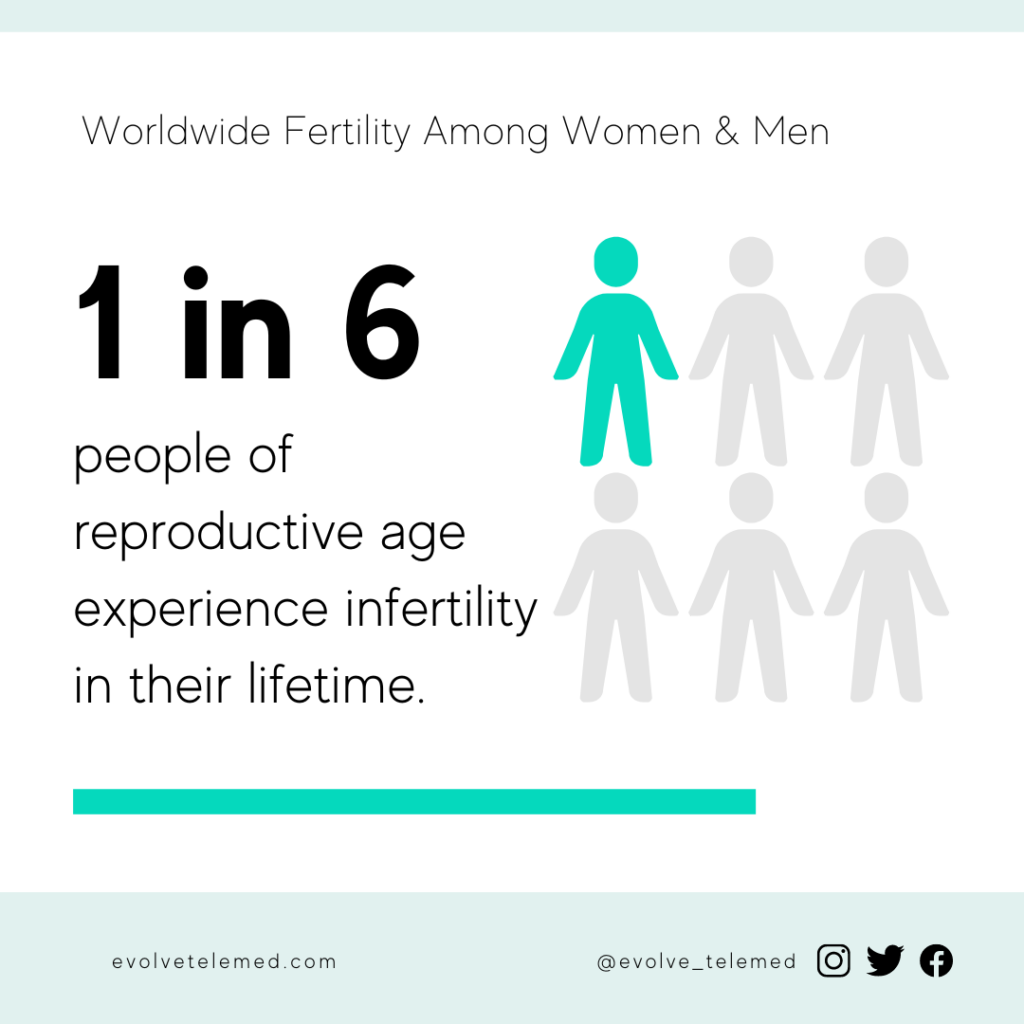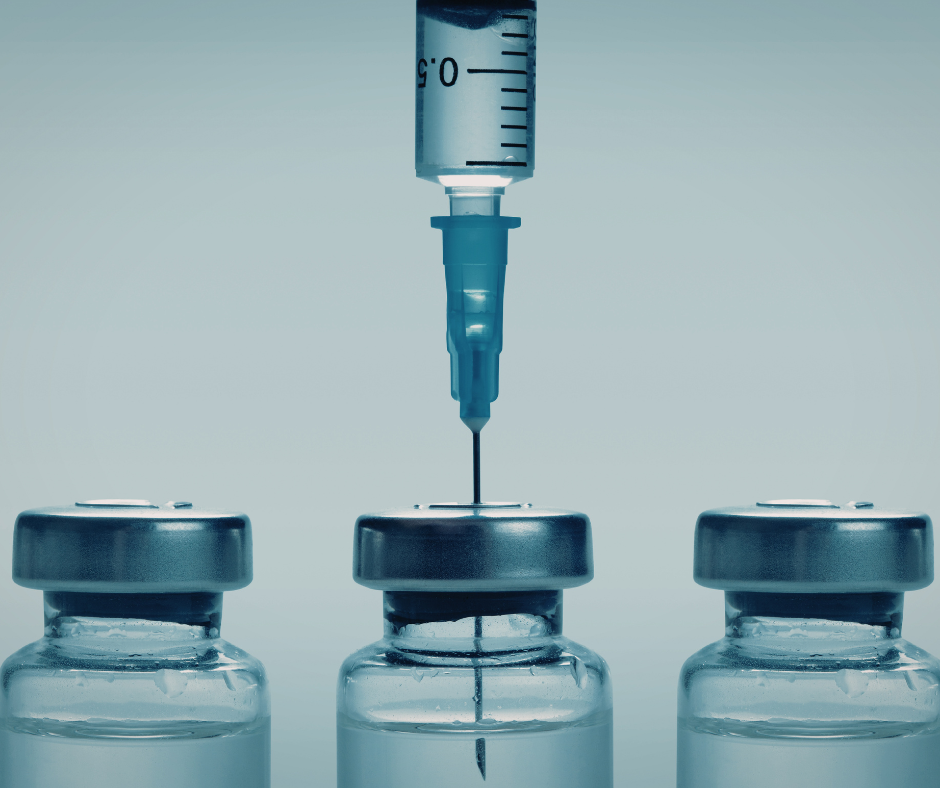For couples facing infertility, all emotions are valid with the heartbreak and emotional battle it brings. Both men and women can struggle with infertility, and the reproductive health of both genders greatly affects chances of conception. It may feel like hope is lost at times, but did you know hormone health plays a significant role in infertility?
This is particularly the case in menstruating women because hormones must signal and regulate the growth of an egg within the ovary, the release of the newly formed egg into the fallopian tube and the thickening of the uterine lining for implantation. The development of sperm is also regulated by hormones within the male body which can impact the likelihood of fertilization. This blog post will raise awareness of infertility, the impact of hormones, and treatment options available.
Understanding Infertility
Infertility is a condition of the female or male reproductive system defined by the inability to achieve pregnancy after 12 months or more of regular, unprotected sexual intercourse. Infertility affects millions of people which impacts both families and communities. According to the World Health Organization (WHO), estimates suggest that about one in every six people of reproductive age worldwide experience infertility in their lifetime.

Common Causes of Infertility
In the female reproductive system, common causes of infertility include:
- Ovulation disorders. Uterine disorders which could be inflammatory in nature (such as endometriosis), congenital in nature (such as septate uterus), or benign in nature (such as fibroids) affect fertility.
- Structural abnormalities. Any abnormal condition of the ovaries or tubes (such as blocked fallopian tubes) can impact fertility rates. Polycystic ovarian syndrome (PCOS) and other follicular conditions of the ovaries can cause infertility.
- Hormonal imbalances. Many factors can affect your hormones, and it is not necessarily abnormal to be imbalanced. Specifically, a disruption of the endocrine system causing imbalances of reproductive hormones can affect fertility. The endocrine system includes the hypothalamus and the pituitary glands. Some common disorders affecting this system include pituitary cancers and hypopituitarism.
Age and Infertility
Age influences the risk of infertility because as you get older, so do your ovaries and eggs inside them. Statistically, a woman’s peak reproductive years are between the ages of late teens and late 20s. By 30, chances of pregnancy decrease and the speed of which fertility rates decline increases with age. By 45, pregnancy is highly unlikely.
Hormone Health and Fertility
Hormone health is crucial in female reproduction because these hormones send signals and regulate various functions of the body for pregnancy to occur. An absence or irregular amount of one or more hormones can delay or prevent regular processes from occurring, making pregnancy difficult to achieve.
The Complex Interplay of Hormones
Key Hormones Involved in Fertility
Many hormones work together within the female reproductive system, which play a key role in fertility. Here is a short overview of the hormones that play a key role in helping a woman conceive:
- Follicle-stimulating hormone (FSH) helps control the menstrual cycle and stimulates the growth of eggs inside the ovaries.
- Luteinizing hormone (LH) encourages ovulation and helps with proper hormone production needed during pregnancy.
- Estrogen thins cervical mucus, and peaks in the days leading up to ovulation, the most fertile window during your cycle.
- Progesterone helps prepare the uterus for pregnancy, and causes the uterine lining, or endometrium, to thicken.
- Testosterone helps to promote the development of follicles, although women only need small quantities of it. In men, if Testosterone levels are low, sperm count may also be low, which can decrease chances of conception.
The Menstrual Cycle and Hormone Fluctuations
A menstrual cycle begins when you get your period or menstruate. This process involves the shedding of a woman’s uterus, and it’s a normal part of the female reproductive system. The cycle prepares your body for a possible pregnancy, and usually lasts between 24 and 38 days. Here are the phases of the menstrual cycle, and the impact they have on fertility:
- Follicular phase (usually takes place from days 6 to 14 of your cycle). During this time, estrogen levels rise, which causes the lining of your uterus to grow and thicken. Also, the follicle-stimulating hormone (FSH) causes follicles in your ovaries to grow. A shortened follicular phase may increase chances of infertility.
- Ovulation (usually takes place in the middle of your menstrual cycle). A sudden increase of the luteinizing hormone (LH) causes the ovary to release its egg. Since the days prior and the day of ovulation are the most likely days to get pregnant during your cycle, it’s important to track your cycle and recognize each phase.
- Luteal phase (usually takes place between days 15 and 28 of your cycle). Your egg leaves your ovary and begins to travel through your fallopian tubes to your uterus. The level of progesterone rises to help prepare your uterine lining for pregnancy. A short luteal phase can be a sign of luteal phase defect (LPD) which can cause infertility or miscarriage.
Female reproductive hormonal imbalances impact fertility. Many hormones play a role- such as estrogen, progesterone, FSH, and LH- in the menstrual cycle, and any major imbalances can affect your chances of getting pregnant.
Common Hormonal Imbalances and Infertility
Polycystic Ovary Syndrome (PCOS)
According to the Office on Women’s Health, Polycystic ovary syndrome (PCOS) is a health issue that affects 1 in 10 women of childbearing age. With PCOS, the hormonal imbalance interferes with the growth and release of eggs from the ovaries. It is one of the most common, but treatable, causes of infertility in women.
If you have PCOS, your ovaries produce an excess amount of Androgen hormones. As a result, this causes your reproductive hormones to become imbalanced. People diagnosed with PCOS often have irregular menstrual cycles, unpredictable ovulation, or missed periods altogether. You may develop small, painless, follicle cysts on your ovaries due to the lack of ovulation. However, not everyone with PCOS has these cysts.
Hypothyroidism and Hyperthyroidism
Have you ever gotten your thyroid health checked? Thyroid health is often overlooked by conventional doctors. If your main thyroid hormones such as T3, T4, and TSH are imbalanced, it may be contributing to the inability to conceive. Overactive or underactive thyroid function can also affect your body in many other ways. Testing your thyroid levels is one of the best ways to understand your health and clear up any confusion.
There are two main thyroid conditions women should be aware of: hypothyroidism and hyperthyroidism. Hypothyroidism is when the thyroid is underactive, meaning it does not produce enough of the hormones needed to support healthy function. When this happens, you could feel tired, get cold easily, and are unable to lose weight. Hyperthyroidism is the opposite of this, and affects less women in the United States than Hypothyroidism does. Hyperthyroidism is when the thyroid is overactive and creating too much of the thyroid hormones. Women who are diagnosed with hyperthyroidism are typically sensitive to heat, experience anxiety, and unexpectedly lose weight.
Other Hormonal Imbalances Affecting Fertility
- Hyperprolactinemia
Hyperprolactinemia, which is characterized by high levels of prolactin, can affect a woman’s ability to conceive. Elevated prolactin levels can disrupt the normal menstrual cycle and inhibit ovulation, making it more difficult for women to get pregnant. By effectively managing and reducing prolactin levels, through treatment such as BHRT, women with hyperprolactinemia can restore their reproductive function and increase their chances of conceiving.
- Adrenal disorders.
There are two main adrenal disorders that can impact fertility: adrenal insufficiency and Cushing’s syndrome. Adrenal insufficiency occurs when the adrenal glands don’t produce enough hormones, leading to fatigue, low blood pressure, and weight loss. This condition can disrupt the delicate hormonal balance necessary for reproductive function. On the other hand, Cushing’s syndrome is characterized by the overproduction of cortisol, which can cause irregular menstrual cycles, reduced fertility, and even hirsutism. These adrenal disorders can have significant effects on a woman’s ability to conceive and maintain a healthy pregnancy, underscoring the importance of medical attention and management.
- Hormonal contraceptives and their impact on fertility
Hormonal contraceptives and birth control methods can impact fertility in different ways. By using hormonal contraceptives such as the pill, patch, or hormonal IUD, women can effectively prevent pregnancy by altering the hormonal balance in their bodies. These contraceptives work by inhibiting ovulation, thereby reducing the chances of fertilization. Additionally, they thicken cervical mucus, making it harder for sperm to reach the egg. Once a woman stops using hormonal contraceptives, her fertility typically returns to normal within a few months. However, some birth control methods can alter your hormones for a longer period of time, potentially making it harder to conceive.
Maintaining Hormone Health for Improved Fertility
Healthy Lifestyle Habits for Hormonal Balance
- Balanced diet and proper nutrition.
Maintaining a balanced diet can play a significant role in balancing women’s hormones and promoting fertility. Consuming a variety of nutrient-rich foods provides the body with essential vitamins and minerals necessary for hormonal regulation. Including foods high in antioxidants, such as fruits and vegetables, can help reduce oxidative stress and support hormone balance. A diet rich in complex carbohydrates, lean proteins, and healthy fats helps stabilize blood sugar levels, which is crucial for hormonal health. Adequate intake of micronutrients like iron, zinc, and B vitamins, obtained from sources like whole grains, legumes, and leafy greens, also supports fertility. Furthermore, maintaining a healthy weight through a balanced diet can positively influence hormone production and improve fertility outcomes.
- Regular exercise and weight management
Regular exercise and managing your weight can help your hormones function properly. Exercising on a consistent basis helps regulate insulin levels, improve metabolism, and maintain a healthy body weight. Plus, exercise helps in weight management, reducing the risk of conditions like polycystic ovary syndrome (PCOS) that can affect fertility. Excess weight, especially abdominal fat, can disrupt hormonal balance and impair fertility. Furthermore, physical activity stimulates the release of endorphins, which can help reduce stress levels and promote hormonal harmony. However, it’s important to strike a balance, as excessive exercise or extreme weight loss can also have adverse effects on hormone production and fertility.
- Stress management and relaxation techniques
There are several relaxation techniques that can help balance women’s hormones and support fertility. Practicing mindfulness meditation can reduce stress levels and promote a sense of calm, which in turn positively affects hormonal balance. Deep breathing exercises, such as diaphragmatic breathing, can help activate the body’s relaxation response and regulate hormone production. Engaging in gentle yoga or stretching routines can promote blood circulation, reduce muscle tension, and contribute to overall relaxation. Additionally, engaging in activities that bring joy and promote emotional well-being, such as spending time in nature, pursuing hobbies, or connecting with loved ones, can help alleviate stress and support hormonal equilibrium.
- Adequate sleep and rest
Proper sleep plays a crucial role in balancing women’s hormones and supporting fertility. During sleep, the body goes through important restorative processes, including hormone regulation. Sufficient and quality sleep helps maintain healthy levels of hormones such as estrogen, progesterone, and follicle-stimulating hormone (FSH), which are essential for reproductive function. Lack of sleep or disrupted sleep patterns can disrupt the delicate hormonal balance, leading to irregular menstrual cycles and potential fertility issues. Additionally, proper sleep supports the body’s overall well-being and reduces stress, which can positively impact hormone production and fertility. Establishing a consistent sleep routine, creating a conducive sleep environment, and prioritizing sleep hygiene are important steps in promoting hormonal equilibrium and optimizing fertility.
Fertility Treatments and Medical Interventions
- Bioidentical hormone replacement therapy (BHRT)
Bioidentical hormone replacement (BHRT) is most suitable for women experiencing a disturbance between the male hormone (androgen) and female hormone (estrogen). Hormone therapy in women aims to promote egg maturation and trigger ovulation. In turn, this increases the chance of successful fertilization between the egg and sperm.
- In vitro fertilization (IVF)
In vitro fertilization (IVF) is a procedure designed to improve fertility in patients who have not been successful with intrauterine insemination or ovulation induction. How does IVF work? Mature eggs are collected from the women’s ovaries and fertilized by sperm in a lab. The fertilized egg (embryo) or eggs (embryos) are then transferred to the uterus to grow and develop.
- Surgical interventions for structural abnormalities
Surgical interventions for structural abnormalities involve an operating procedure for men or women to correct a certain condition which may be causing infertility. Some conditions in women that may cause infertility, but can be corrected by surgery include: endometriosis, fibroids, polyps, and other various reproductive organ conditions. For men, fertility surgery can be used to reverse a vasectomy or treat varicocele. Hysteroscopy or laparoscopy are the two most common surgical approaches for female fertility surgeries.
Seeking Professional Help and Support
It’s important to seek medical advice because healthcare professionals want to find solutions and improve chances of fertility. When seeking fertility assistance, fertility clinics and reproductive endocrinologists can be a great source for information, support, and guidance. Reproductive endocrinologists are doctors who specialize in diagnosing and treating infertility. Support groups and online communities can be a great resource for additional support and building relationships. Having a support network can enhance your overall well-being, form better coping skills, and encourage a happier life. Emotional well-being and coping strategies are essential for reducing stress, anxiety, and depression.
Summary
While we focused here on women, men can also experience infertility. It’s important to identify common causes of infertility, and understand the role hormonal imbalances play in infertility. In women, the main hormones that work together in the reproductive system are: the follicle-stimulating hormone, the luteinizing hormone, estrogen, progesterone, and testosterone. Each hormone plays a significant role in the female reproductive system, and any imbalances can affect fertility. Additionally, hyperprolactinemia, adrenal disorders, and hormonal contraceptives can greatly impact chances of fertility.If you or someone you know is experiencing infertility, seeking professional help to understand your hormones can greatly improve chances of pregnancy. All emotions are valid when it comes to infertility, but remaining optimistic and finding ways to build relationships within your community can greatly impact your overall health and outlook on life. Take the first step, and consider booking an appointment with an expert at Evolve Telemedicine today or call (800) 407-4117 to schedule a consultation.






